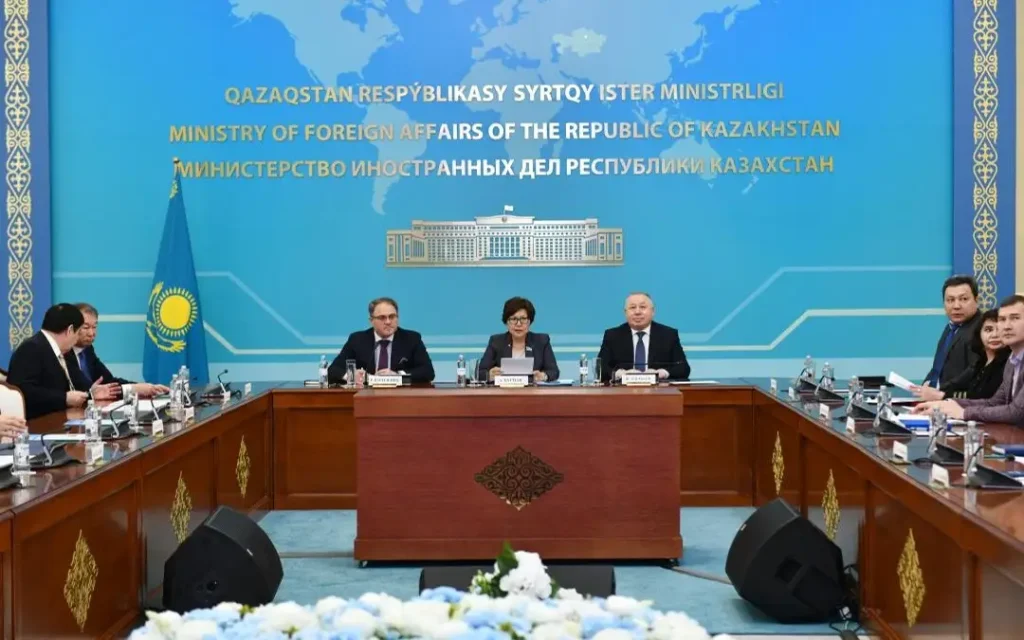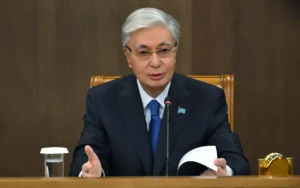Kazakhstan’s foreign policy prioritizes regional security and stability

Astana, The Gulf Observer: In the culminating session of 2023, the Ministry of Foreign Affairs of the Republic of Kazakhstan convened the conclusive gathering of the Public Council under its purview according to the Kazakh Foreign Ministry’s press service.
This pivotal meeting served as a platform for comprehensive discussions and strategic evaluations, emphasizing the vital role of public engagement in shaping foreign policy initiatives. The Council’s deliberations underscored the commitment to transparency and inclusive decision-making, reaffirming the government’s dedication to fostering collaboration between citizens and the diplomatic sphere in charting the nation’s international course.
During the convened session, a comprehensive assessment of the Foreign Ministry’s achievements throughout 2023 was meticulously conducted, culminating in the endorsement of the operational agenda for the Public Council in the upcoming year of 2024. Led by Aigul Kuspan, Chair of the Committee on Foreign Affairs, Defense, and Security of the Mazhilis of Parliament of the Republic of Kazakhstan, the Council convened with esteemed participation from diverse sectors, comprising representatives from civil society, scientific communities, and human rights organizations. This inclusive gathering underlined the commitment to a multifaceted approach, incorporating perspectives from various domains to chart an informed and comprehensive trajectory for the nation’s diplomatic initiatives in the forthcoming year.
Deputy Foreign Minister Roman Vassilenko’s comprehensive report underscored the steadfast priorities entrenched within Kazakhstan’s foreign policy, emphasizing an unwavering commitment to regional security and stability, bolstering the nation’s prominence in both regional and global political landscapes, and safeguarding national interests abroad. Notably, Kazakhstan’s resolute advocacy for upholding the UN Charter, adherence to international law, and the principles of equality and democracy in international relations formed a cornerstone of the outlined objectives. Highlighting the Ministry of Foreign Affairs’ proactive engagement, Vassilenko emphasized its proactive efforts in fortifying trade, economic, investment, cultural, and humanitarian relations with foreign nations. Furthermore, Kazakhstan’s strides in enhancing tourism appeal were highlighted, particularly through an expanded international legal framework, resulting in a notable increase to 83 visa-exempt countries across various passport types, including 30 for national passports, showcasing the nation’s growing global connectivity and accessibility.
The report placed particular emphasis on the pivotal role played by the Consular Service, which serves as the primary interface with citizens of Kazakhstan abroad. Notably, amidst the natural disasters in Turkey and the escalating conflict in the Middle East during 2023, concerted efforts were mobilized to facilitate the safe evacuation of Kazakhstani citizens. Through collaborative intergovernmental endeavors, a total of 400 citizens, accompanied by their families, were successfully evacuated and repatriated to Kazakhstan, underscoring the efficacy and responsiveness of the Consular Service in safeguarding the well-being and safety of nationals during challenging and crisis-ridden circumstances abroad.
The Deputy Minister also provided an overview to the attendees, citing that Kazakhstan’s embassies worldwide meticulously assessed over 12,000 inquiries during the period, underscoring the diplomatic corps’ efficacy with an impressive 99.3% rate of positive resolutions to the received appeals. Deputy Minister Vassilenko put forth a proposition to the Public Council members, proposing the initiation of a public oversight initiative in the upcoming year. This initiative aims to conduct a comprehensive public monitoring exercise scrutinizing the Ministry of Foreign Affairs’ handling of citizen appeals, emphasizing transparency and accountability in the diplomatic process.
Throughout the deliberations focusing on the outcomes of the Council’s Committees regarding foreign economic endeavors, image cultivation, and the human dimension, the respective committee chairs presented comprehensive reports delineating their accomplishments over the preceding year. These detailed summaries encapsulated the initiatives undertaken and milestones achieved within their spheres of responsibility. Additionally, the committee heads outlined meticulous work plans charting the strategic roadmap for the upcoming year, reflecting a forward-looking approach aimed at continued progress and efficacy in addressing key aspects of foreign affairs and diplomatic engagements.
The discourse witnessed a constructive and fruitful exchange of perspectives concerning the future trajectory of the Public Council. Council members actively engaged in sharing their insights and recommendations, fostering a dialogue geared toward enhancing the Council’s endeavors. Expressing appreciation, the Council members conveyed gratitude to the leadership of the Ministry for their stewardship and acknowledged the Ministry of Foreign Affairs’ earnest commitment to fostering a collaborative partnership with the Public Council. This mutual eagerness for cooperation reflects a shared goal to elevate the caliber and effectiveness of the Council’s undertakings, emphasizing a joint pursuit of excellence in advancing diplomatic initiatives and engagements.


